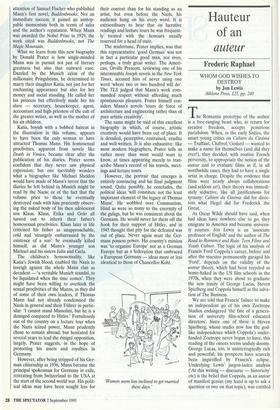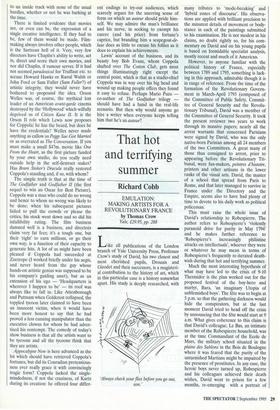Hauteur of an auteur
Frederic Raphael
WHOM GOD WISHES TO DESTROY by Jon Lewis Athlone Press, £25, pp. 240 The Romantic prototype of the author is a free-ranging beast who, in return for creative freedom, accepts penurious pariahdom. When, in the early Sixties, the smart young critics on Cahiers du Cinema — Truffaut, Chabrol, Godard — wanted to make a name for themselves (and did they ever!), they decided, with routine French perversity, to appropriate the notion of the auteur and to evaluate films as if, in all worthwhile cases, they had to have a single artist in charge. Despite the evidence that films were nearly always collaborations (and seldom art), their theory was immedi- ately seductive, like all justifications for tyranny: Cahiers du Cinema did for direc- tors what Hegel did for Frederick the Great.
As Oscar Wilde should have said, when bad ideas have nowhere else to go, they emigrate to America and become universi- ty courses. Jon Lewis is an 'associate professor of English' and the author of The Road to Romance and Ruin: Teen Films and Youth Culture. The logic of his analysis of Francis Ford Coppola's career, before and after the maestro permanently garaged his 'Ford', depends on the validity of the auteur theory, which had been recycled as home-baked in the US film schools in the 1970s, when they were about to graduate the new trinity of George Lucas, Steven Spielberg and Coppola himself as the salva- tion of The Business.
We are told that Francis' failure to make an independent go of his own Zoetrope Studios endangered 'the fate of a genera- tion of university film-school educated directors'. Since one of these is Steven Spielberg, whose studio now has the god- like independence which Coppola's under- funded Zoetrope never began to have, this reading of the omens seems unduly doomy. George Lucas, too, is uninterruptedly rich and powerful; his prospects have scarcely been imperilled by Francis's eclipse. Underlying Lewis' jargon-laden analysis ('At this writing — discourse — historicity' etc) is the belief that Coppola, as an auteur of manifest genius (my hand is up to ask a question or two on that topic), was entitled to an inside track with none of the usual hurdles, whether or not he was barking at the time.
There is limited evidence that movies are, or even can be, the expression of a single creative intelligence. If they had to be, few of them would be made. Film- making always involves other people, which is the Sartrean hell of it. Very, very few directors have Chaplin's ability to write, act in, direct and score their own movies, and nor did Chaplin, if rumour serves. If it had not seemed paradoxical for Truffaut etc. to accuse Howard Hawks or Raoul Walsh or John Ford or Sam Fuller (Sam Fuller?) of artistic integrity, they would never have bothered to propound the idea. Orson Welles was, of course, the mythical lost leader of an American avant-garde cinema destroyed by the 'Hollywood' which wilfully deprived us of Citizen Kane II. It is the Orson II role which Lewis now proposes for Coppola; he has the beard, but does he have the credentials? Welles never made anything as callow as Peggy Sue Got Married or as overrated as The Conversation. If you must make a small $47m. movie like One From the Heart, as the first picture funded by your own studio, do you really need outside help in the self-destruct stakes? Has Bram Stoker's Dracula really restored Coppola's standing and, if so, with whom?
The simple truth is that at the time of The Godfather and Godfather II (the first sequel to win an Oscar for Best Picture), Coppola was a man who could do no wrong and hence to whom no wrong was likely to be done; when his subsequent pictures failed to pull the crowds or please the critics, his stock went down and so did his infallibility rating. The film business damned well is a business, and directors claim very fat fees; it's a tough one, but their 'right' to earn millions, or go their own way, is a function of their capacity to generate hits. A lot of us might have been pleased if Coppola had succeeded at Zoetrope (I worked briefly under his aegis, and never heard from the guy whose hands-on artistic genius was supposed to be his company's guiding asset), but as an extension of his ego — 'Headquarters is wherever I happen to be' — its roof was always like to fall in. Like Attenborough and Puttnam when Goldcrest collapsed, the toppled tycoon later claimed to have been an innocent victim, when it would have been more honest to say that he had proved a less cunning manipulator than the executive clowns for whom he had adver- tised his contempt. The comedy of today's show business is that all the artists want to be tycoons and all the tycoons think that they are artists.
Appocalypse Now is here advanced as the hit which should have retrieved Coppola's fortunes, but did its Conradian pretentious- ness ever really grace it with convincingly tragic form? Coppola lacked the single- mindedness, if not the craziness, of Kurtz during its creation: he offered four differ- ent endings to try-out audiences, which scarcely argues for the unerring sense of form on which an auteur should pride him- self. We may admire the man's brilliance and his nerve, in seeking to exempt his career (and his price) from fortune's caprice, but branding him a scapegoat-de- luxe does as little to excuse his follies as it does to explain his achievements.
Lewis' account of the business, and its beasty boy Bob Evans, whom Coppola shafted over The Cotton Club, gets most things illuminatingly right except the central point, which is that as a studio-chief Coppola was in way over his big head and wound up making people offers they found it easy to refuse. Perhaps Mario Puzo — co-author of The Godfather trilogy — should have had a hand in the real-life scenario. But then why would anyone go hire a writer when everyone keeps telling him that he's an auteur?



















































 Previous page
Previous page